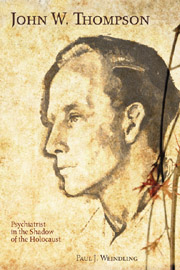Book contents
- Frontmatter
- Contents
- List of Illustrations
- Acknowledgments
- List of Abbreviations
- Part One Into the Dark
- Part Two Redemption
- Part Three Aftermath
- 13 UNESCO: At the Conscience of the World
- 14 The Eau Vive Affair
- 15 Sebastian
- 16 Matthias
- 17 Child Guide
- 18 New York: “St. John the Psychiatrist”
- 19 Hallucinations
- 20 “Dying We Live”
- Appendix John Thompson's Writings
- Notes
- Sources
- Index
16 - Matthias
from Part Three - Aftermath
Published online by Cambridge University Press: 12 September 2012
- Frontmatter
- Contents
- List of Illustrations
- Acknowledgments
- List of Abbreviations
- Part One Into the Dark
- Part Two Redemption
- Part Three Aftermath
- 13 UNESCO: At the Conscience of the World
- 14 The Eau Vive Affair
- 15 Sebastian
- 16 Matthias
- 17 Child Guide
- 18 New York: “St. John the Psychiatrist”
- 19 Hallucinations
- 20 “Dying We Live”
- Appendix John Thompson's Writings
- Notes
- Sources
- Index
Summary
An Anxious Child
Matthias lived in a small chapel on a hill at Eau Vive, marking one of the stations of the cross. He was studious, sensitive, acutely intelligent—and incorrigibly morose. He took his doubts, uncertainties, and anguish to John, on whom he became increasingly dependent. His introverted, reflective nature contrasted to the extrovertly roguish Sebastian. Natasha Spender remembers Matthias at Eau Vive as a “stretcher case,” entirely quiet and withdrawn.
Matthias Georg Leber was born in Lübeck on April 21, 1931. He was baptized with his sister Katharina (two years older) as a Roman Catholic in 1933, when their father was sent to a concentration camp. Their mother hoped that the Catholic church might give the children some protection. She told them that their father's work had taken him on a journey and that he was writing a book.
Matthias's father, Julius or Jules Leber, was a robustly militant Social Democrat. Julius was born on November 16, 1891 in Biesheim, Alsace, the illegitimate child of the twenty-three-year-old Katharina Schubetzer. He was strongly influenced by Catholicism, his family's peasant background, and a firm sense of his German national identity. His apprenticeship led him to socialist convictions. He passed the Abitur examinations at the end of his secondary education, qualifying him for university studies. In 1915 he interrupted his studies at Freiburg University to volunteer for military service.
- Type
- Chapter
- Information
- John W. ThompsonPsychiatrist in the Shadow of the Holocaust, pp. 256 - 264Publisher: Boydell & BrewerPrint publication year: 2010



